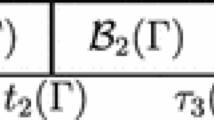Abstract
We consider the scheduling problems arising when several agents, each owning a set of nonpreemptive jobs, compete to perform their respective jobs on one shared processing resource. Each agent wants to minimize a certain cost function, which depends on the completion times of its jobs only. The cost functions we consider in this paper are maximum of regular functions (associated with each job), number of late jobs and total weighted completion time. The different combinations of the cost functions of each agent lead to various problems, whose computational complexity is analysed in this paper. In particular, we investigate the problem of finding schedules whose cost for each agent does not exceed a given bound for each agent.
Similar content being viewed by others
References
Agnetis, A., P.B. Mirchandani, D. Pacciarelli, and A. Pacifici. (2004). “Scheduling Problems with Two Competing Agents.” Operations Research, 52(2), 229–242.
Arbib, C., S. Smriglio, and M. Servilio. (2004). “A Competitive Scheduling Problem and its Relevance to UMTS Channel Assignment.” Networks, 44(2), 132–141.
Baker, K.R. J.C. Smith. (2003). “A Multiple-Criterion Model for Machine Scheduling.” Journal of Scheduling, 6(1), 7–16.
Brewer, P.J. and C.R. Plott (1996). “A Binary Conflict Ascending Price (BICAP) Mechanism for the Decentralized Allocation of the Right to Use Railroad Tracks.” International Journal of Industrial Organization, 14, 857–886.
Chen, Y., Y. Peng, T. Finin, Y. Labrou, S. Cost, B. Chu, J. Yao’, R. Sun, and B. Wilhelm. (1999). “A Negotiation-Based Multi-Agent System for Supply Chain Management.” In Proc. of the Agents’99 Workshop “Agent-Based Decision-Support for Managing the Internet-Enabled Supply-Chain,” Seattle, WA, pp. 15–20.
Conway, R.W., W.L. Maxwell, and L.W. Miller. (1967). Theory of Scheduling. Reading, MA: Addison Wesley.
Huang, X. and J.C. Hallam. (1995). “Spring-Based Negotiation for Conflict Resolution in AGV Scheduling.” In Proceedings of the IEEE International Conference on Systems, Man and Cybernetics.
Kim, K., B.C. Poulon, C.J. Petrie, and V.R. Lesser. (2000). “Compensatory Negotiation for Agent-Based Project Schedule Coordination.” CIFE Working Paper #55. Stanford University.
Lawler, E.L. (1973). “Optimal Sequencing of a Single Machine Subject to Precedence Constraints.” Management Science, 19, 544–546.
Moore, J.M. (1968). “An n Job, One Machine Sequencing Algorithm for Minimizing the Number of Late Jobs.” Management Science, 15, 102–109.
Osborne, M.J. and A. Rubinstein. (1994). A Course in Game Theory. Cambridge: MIT Press.
T’kindt, V. and J.C. Billaut. (2002). Multicriteria Scheduling. Berlin: Springer-Verlag.
Author information
Authors and Affiliations
Corresponding author
Rights and permissions
About this article
Cite this article
Agnetis, A., Pacciarelli, D. & Pacifici, A. Multi-agent single machine scheduling. Ann Oper Res 150, 3–15 (2007). https://doi.org/10.1007/s10479-006-0164-y
Published:
Issue Date:
DOI: https://doi.org/10.1007/s10479-006-0164-y



